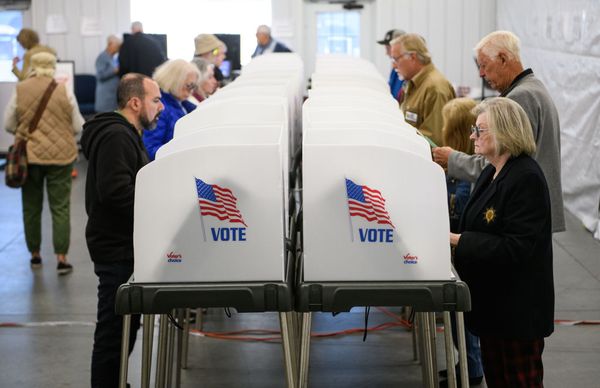COLUMBIA, S.C. — Former Hampton banker Russell Laffitte, who faces some 30 years in prison in connection with Alex Murdaugh’s alleged fraud schemes, should not have his current bond conditions relaxed, federal prosecutors said Aug. 31 in a new filing they say shows the seriousness of his crimes.
Those arguments plus more will be heard Tuesday in Charleston before U.S. Magistrate Judge Molly Cherry, who will decide whether Laffitte, 51 — indicted on state and federal charges — should have to wear a federally required GPS tracking monitor in additional to a state GPS monitor.
“Laffitte exploited the vulnerabilities of the very people for whom he was appointed to serve as fiduciary, preying upon and profiting from the assets he was charged and entrusted with managing,” prosecutors wrote.
“And he did so all while an employee, officer, or director at Palmetto State Bank. He unilaterally misapplied Palmetto State Bank funds to provide ‘sham’ loans to (Murdaugh), despite the palpable financial risks associated, all in furtherance of the scheme,” they added.
In all, Laffitte, a childhood friend of Murdaugh’s, faces six federal charges of various types of financial fraud that carry sentences of up to 30 years in prison.
Federal and state prosecutors have alleged that the former CEO of Palmetto State Bank schemed with now-disbarred attorney Murdaugh to illegally use money belonging to various conservatorships under Laffitte’s control.
Laffitte was fired as CEO last January, the top position at his family-owned bank after working his way up from a teller’s postion over 25 years. As CEO, he exercised substantial control over the bank’s loans and internal accounts.
Separately, Murdaugh, 54, faces 90 different charges in state court alleging he stole more than $8.7 million from fellow lawyers, clients and associates. He also faces charges in the June 2021 double slayings of his wife and son.
Murdaugh faces maximum sentences totaling hundreds of years in prison.
Laffitte is innocent until proven guilty, has no criminal history, has deep local family ties and has already appeared voluntarily numerous times to talk with law enforcement, so there’s no need to make him wear a federal tracking device, Laffitte’s lawyers said in the Aug. 31 court filing.
Neither state nor federal authorities “have a significant amount of evidence” against their client, Laffitte’s lawyers said.
Feds shed more light on Laffitte’s alleged role
The arguments to be laid out in court Tuesday will touch on Laffitte’s bond conditions and his alleged schemes.
In the Aug. 31 court filing, prosecutors said Laffitte is currently employed by his family partnership, which pays him $230,000 annually to farm family property. But in response, his lawyers — Bart Daniel and Matt Austin — said their client only gets $84,000 a year and the federal GPS tracker should go.
Federal prosecutors Emily Limehouse and Winston Holliday disagree.
Laffitte’s current bond conditions — which allow him to look after his farm holdings and to travel across the state for his son’s football games — should not be relaxed, in large part because his mishandling of money entrusted to his safekeeping is so serious, prosecutors said.
“The evidence (against Laffitte) is overwhelming,” prosecutors wrote, citing emails between Laffitte and Murdaugh not mentioned in two previous federal indictments, both of which allege the former banker played an active role in shuffling money in internal bank accounts and conservatorships so he and Murdaugh could tap them for loans.
For example, on Oct. 22, 2013, prosecutors said when Murdaugh overdrafted his Palmetto State Bank checking account by $64,643, Laffitte sent Murdaugh an email.
“Need a deposit. Thought you were coming in yesterday,” Laffitte wrote.
“Sorry I forgot. Can u make a loan from (a conservator account identified by the initials H.P.) and I will pay it as we discussed,” Murdaugh then replied.
The “H.P.” account refers to Hannah Plyler, who, with her sister, have sued Laffitte and his former bank over money owed to them through an account set up after their mother and teenage brother were killed in a car crash.
The next day, Oct. 23, 2013, Laffitte transferred $70,000 from Plyler’s account to Murdaugh.
“I transferred 70k this morning,” Laffitte wrote to Murdaugh, according to the prosecutors’ filing.
In another example that prosecutors say showed Laffitte’s close working relationship with Murdaugh is how they both kept a watchful eye on Plyler’s conservatorship.
Under rules of the conservatorship, the money in it had to be turned over to her when she turned 18.
“The evidence will show that Laffitte and the Bank Customer (Murdaugh) were closely tracking when H.P. would turn eighteen, at which point they would have to pay back the loans (they had taken out using H.P.’s money) in full,” prosecutors wrote.
In March 2014, Murdaugh wrote Laffitte an email.
“How long before (H.P.) is 18?” Murdaugh wrote to Laffitte, the prosecutors’ filing said.
When Plyler turned 18, Murdaugh had to pay off the remainder of the outstanding loans that Laffitte had given him through her account, and Laffitte extended a $500,000 line of credit to Murdaugh, purportedly for “farming,” prosecutors said.
That “farming” loan enabled Murdaugh to pay off what he owed to Plyler’s conservatorship, prosecutors wrote.
During the life of Plyler’s conservatorship and a conservatorship for her younger sister, Laffitte had collected more than $250,000 in fees from their funds. He had also given himself eight loans “at favorable rates” totaling $355,000, prosecutors wrote.
Laffitte also provided Murdaugh with 13 unauthorized loans from Plyler’s conservatorship, totaling $990,000, prosecutors wrote.
Although Laffitte’s lawyers said that he had cooperated extensively with the FBI, federal prosecutors disputed that contention, saying that Laffitte had lied. They said that while most of Laffitte’s alleged crimes with Murdaugh took place in 2015 and before, Laffitte was still moving bank money around for Murduagh in summer and fall 2021, the filing said.
In June 2021, Murdaugh’s wife Maggie and son Paul were fatally shot at the family 1,700-acre estate in Colleton County. A year later in July, Murdaugh was charged with two counts of murder in their deaths.
Prosecutors alleged that after the killings, Laffitte allegedly continued to shuffle hundreds of thousands of dollars around to “conceal” his role in the schemes.
“In sum, the nature and circumstances of the offenses and the weight of the evidence supporting the same both militate in favor of restrictive bond conditions,” prosecutors wrote.
Those circumstances and offenses, prosecutors argue, warrant Laffitte wearing two GPS tracking monitors.
Laffitte’s lawyers, however, want the federal government to lift its requirement, saying their client is not a flight risk and the extra federal monitor is not needed
”He is not hiding. He is not denying many of the underlying facts in this case,” Laffitte’s lawyers said. “He simply disagrees with the Government’s belief that he knowingly and intentionally joined Alex Murdaugh’s criminal scheme, and the undersigned counsel looks forward to proving that the Government’s theories about Mr. Laffitte are unfounded.”
_____







